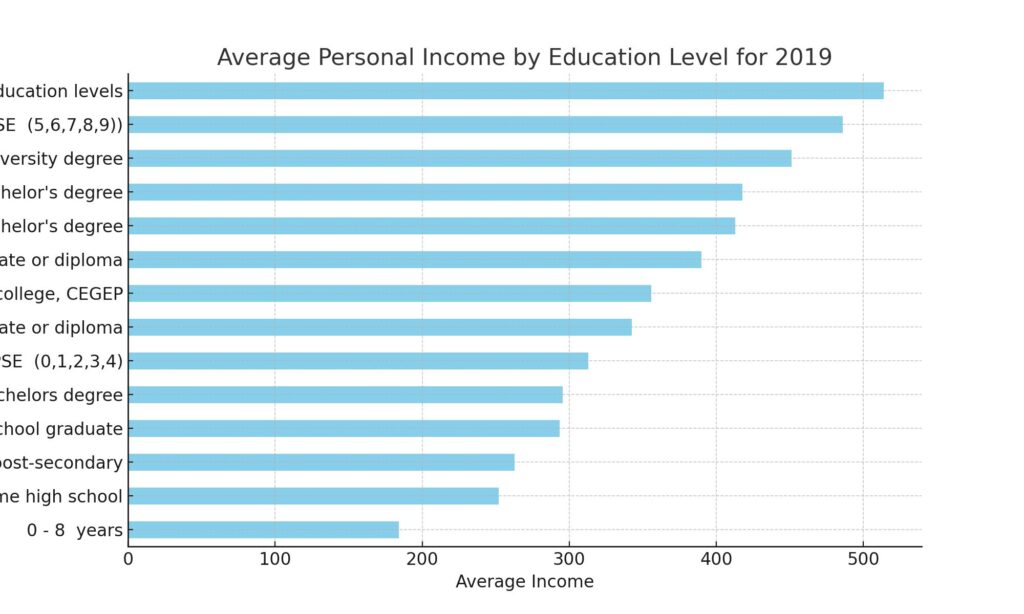Average Personal Income by Education Level
- May 2, 2024
- Posted by: Zoológico Santa Fe business solutions
- Category: Uncategorized
2024 Big Data Analysis: Average Personal Income by Education Level
Uncover the strong link between education and income from a 2024 big data analysis. Explore how higher education correlates with higher incomes and understand its interaction with age.
- Education and Income Correlation: The analysis reveals a strong correlation between educational attainment and personal income levels. Higher levels of education generally lead to higher incomes, emphasizing the pivotal role of education in economic success.
- Demographic Factors: The relationship between education and income is influenced by various demographic factors such as age, location, and gender. Understanding how these factors interact is crucial for addressing income inequality effectively.
- Policy Implications: Policymakers should prioritize strategies to enhance educational access across all social strata. This includes implementing policies to increase access to education, particularly for marginalized groups, and promoting lifelong learning programs to meet the evolving demands of the workforce.
- Gender Income Disparity: Specific actions must be taken to address and reduce the income gap between genders. Ensuring equal opportunities for women in high-paying jobs and leadership roles is essential for achieving gender equality in the workforce.
Prepared by: Zoológico Santa Fe business solutions
Summary
In 2024, a comprehensive big data analysis revealed a profound correlation between educational attainment and personal income. This study underscores the pivotal role of education in enhancing economic opportunities and personal success. The data strongly suggests that higher education levels correlate with increased personal incomes, indicating that higher education serves as a key mechanism for securing better job opportunities and higher wages.
Furthermore, the analysis illuminates how the relationship between education and income interacts with other demographic factors such as age, location, and gender, analyzing how these elements contribute to income inequality. This insight is critical for policymakers to consider when developing strategies to improve access to education and enhance lifelong learning programs.

Introduction
In 2024, a comprehensive analysis of big data has revealed significant insights into how educational attainment correlates with personal income levels. This report seeks to explore the extent to which education enhances economic opportunities and success across various demographics.
Main Analysis
The data clearly indicates that individuals with higher levels of education tend to earn significantly higher incomes. This trend underscores the critical role of education in accessing better job opportunities and commanding higher wages in the labor market. Moreover, the analysis has also highlighted how other demographic factors such as age, location, and gender interact with educational levels to influence income.
Conclusion and Recommendations
Given the findings, it is imperative for policymakers to consider strategies that enhance educational access across all social strata. Recommendations include:
- Enhancing Education Accessibility: Implement policies that increase access to education at all levels, particularly focusing on marginalized groups.
- Promoting Lifelong Learning: Strengthen programs that support ongoing education and training to meet the changing demands of the global economy.
- Addressing Gender Income Disparity: Take specific actions to address and reduce the income gaps between genders, ensuring that women have equal opportunities for high-paying jobs and leadership roles.
Here are some research papers discussing the relationship between average personal income and education level:
- Whose Education Matters in the Determination of Household Income? Evidence from a Developing Country
This study compares various models to determine that the maximum or average level of education in a household better explains household income. It uses robust methods to predict income across a sample (Jolliffe, 2002). - The Gender Income Gap and the Role of Education
Despite educational gains, a persistent earnings gap exists between college-educated men and women, pointing to other work-related factors that also influence income inequality (Bobbitt‐Zeher, 2007). - An Empirical Analysis of Effects of Educational Level on Personal Income
Analyzing data from city residents, this paper employs regression models to demonstrate the effect of educational level on personal income, showing a clear positive correlation (Qing-ran, 2010). - Are We Overestimating the Returns from a College Education?
Historical data shows a stable income differential favoring college graduates over high school graduates, suggesting significant returns from higher education (Renshaw, 1972). - Income Inequality and Education
This study uses data and simulations to examine the impact of educational attainment on income inequality, finding that feasible educational policies may have only minor effects on reducing inequality (Breen & Chung, 2015).
Leave a Reply
You must be logged in to post a comment.

